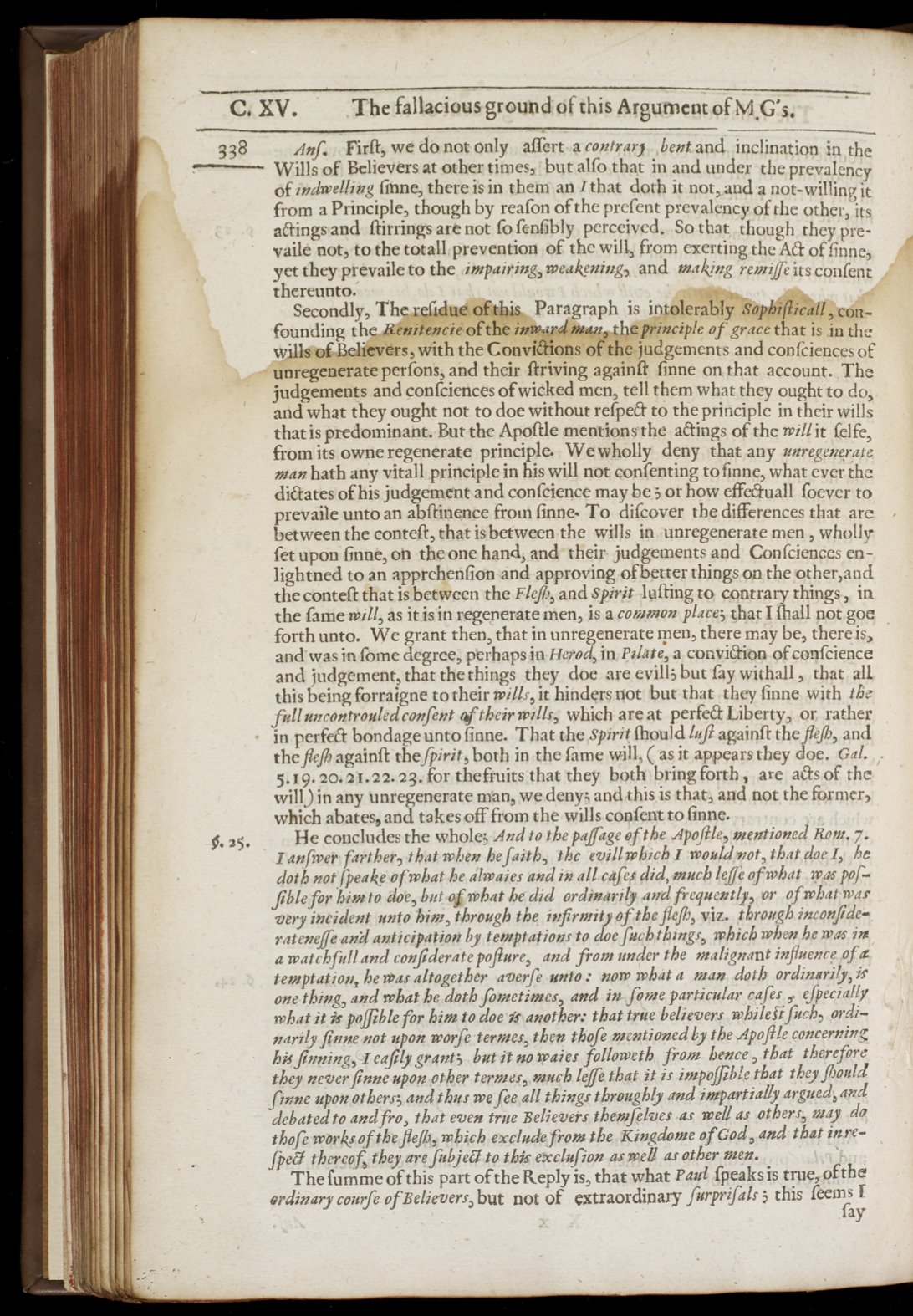

C. XV.
The
fallacious
ground
of
this Argument
of
VI
G
"s.
338
Anf. Firft, we
do
not only afïert
a contrary
bent
and
inclination
in the
Wills
of
Believers
at
other
times,
but
alto
that
in
and under the
prevalency
of
indwelling finne
,
there
is
in
them
an
/that
loth
it
not and
a
not
-
willing it
from
a
Principle, though
by reafon
of
the prefent
prevalency
of
the other,
its
a&ings
and
ftirrings are not
fo fenfibly
perceived.
So
that
though they
pre
-
vaile
not,
to
the totali prevention
of
the
will, from exerting the
A&
of
finne,
yet they
prevaile
to
the
impairing, weakening,
and
making rem its
confent
thereunto:
Secondly,
The
refidue
of
Paragraph
is
intolerably
sophiflicall, con-
founding
the
Renitencie
ofthe
inward man,
the
principle
of' grace
that
is
in
the
wills
of
Believers,
with the Convi
&ions
of
the
judgements and
confciences
of
unregenerate perlons, and their ftriving againft
finite
on
that
account.
The
judgements
and
confciences
of
wicked men, tell them what they ought to do,
andwhat they ought not
to
doe without
refpe&
to the
principle
in
their
wills
that
is
predominant.
But
the
Apoftle
mentions the adings
of
the
will
it
felfe,
from
its
owne regenerate principle.
We
wholly deny
that
any
unregenerate
man
hath
any
vitali
principle
in his will
not
confenting
to
finne,
what
ever the
di&ates
of
his
judgement and
confcience may be
;
or how
effe&uall
foever
to
prevaile
unto
an
abl
inence from
finne.
To
difcover
the
differences
that
are
between the conteft,
that
is
between
the
wills in
unregenerate
men
,
wholly
fet upon
finne,
on
the one hand,
and
their judgements and
Confciences
en-
Iightned
to
an
apprehenfion and approving
of
better
things on
the other,and
the
conteft
that
is
between
the
Flefi,
and
Spirit
lofting
to contrary
things
,
in
the
fame will,
as
it
is
in
regenerate men,
is a common place;
that
I
(hall
not
goe
forth
unto.
We grant then, that
in
unregenerate men,there
may
be, there
is,
and
was in
Tome
degree, perhaps
in
Herod,
in Pilate,
a
convi
&ion
of
confcience
and judgement, that the
things they doe are evil!;
but
fay
withal!, that
all
this being forraigne
to their
wills,
it hinders not
but that
they
finne
with the
full
uncontrouled confent
of
their
wills, which
are
at
perfe&
Liberty,
or rather
in pet-fed
bondage unto
finite.
That
the spirit fhould
lull againft
the
flefh,
and
thefefh
againft
the
fpirit,
both
in
the
fame will,
(as
it
appears they doe.
Gal.
.
5.5
g.
20.2
1.22.23.
for
the
fruits
that
they
both
bring
forth,
are
ads
of
the
will)
in
any
unregenerate
man, we deny; and this
is
that,
and
not the former,
which
abates, and takes
off
from
the
wills
confent
to
finne.
4.25.
He concludes
the
whole;
And
to
the
paffage
of
the
Apoflle,
mentioned
Row.
7.
I
anfwer
farther, that
when
he
faith,
the evil which
I
would'
not,
that
doe
I,
he
cloth
not
f
pea&e
o
fwhat
he
tilwaies
and
in
all
cafes
did,
much
leffe
of
what
was
pof-
fible
forhim
to
doe, but
of
what
he
did
ordinarily
and
frequently,
or
of
what was
very
incident
unto
him,
through
the infirmity
of
the
flefh,
viz.
through
ineonflde
-,
rateneff
e
and
anticipation
by
temptations
to doe
fuch
things, which
when he
was
in
a watchful!
and
confderatepoflure, and
from
under the malignant
influence
oft'
temptation,
he
was
altogether
averfe unto
:
now
what
a
man
doth ordinarily, is
one
thing,
and
what
he Both
fometimes,
and
in
'brae
particular
cafes efpecially
what
it
is
poJble
for
him
to
doe
is
another:
that
true believers whilefr
fuch, ordi-
narilyfinne
not
upon worfe
termes,
then
theft
mentioned
by
the
Apofile
concerning
his
finning,
Iearlygrant;
but
it
nowaies followeth
from
hence,
that
therefore
they
neverfinne
upon
other termes,
much
leffe
that
it
is impofJble
that
theyfboulet
f
inne
upon
others;
and thus
we
fee all
things
throughly
and impartially
argued,
and
debated
to
and
fro
,
that
even
true
Believers themfelves as well as others,
may do
thofe works
of
theflefh, which exclude
from the
Kingdome
of
God
and
that
cure
-
fpell
thereof,
they
are
fubjeli
to
this exclufion
as well
as other men.
The
fumme
of
this
part
of
the
Reply
is,
that
what
Paul fpeaks
is
true,
ofthe
ordinary
court
of
Relievers,
but
not
of
extraordinary
furprifals
9
this
feems
f
fay










